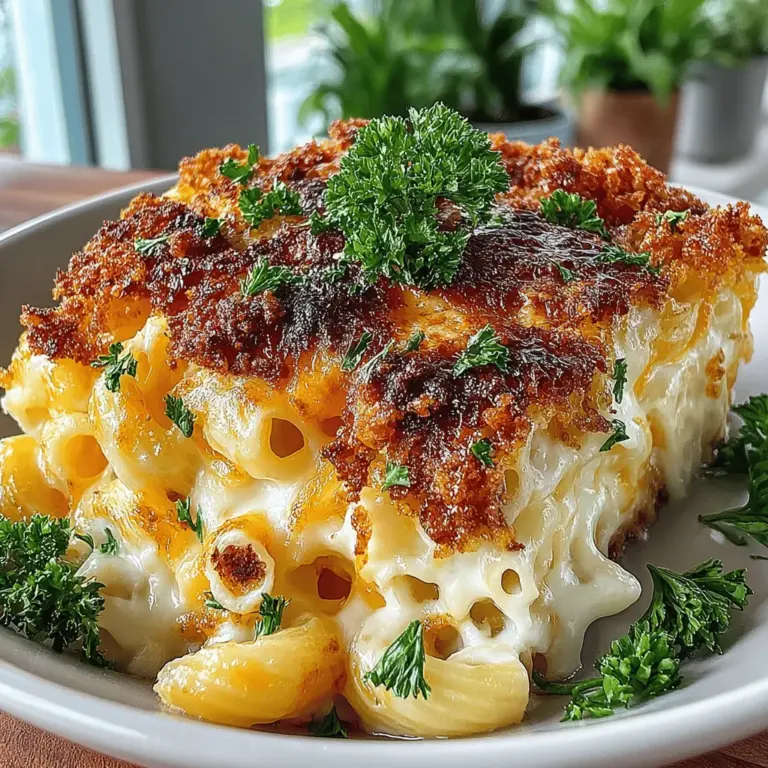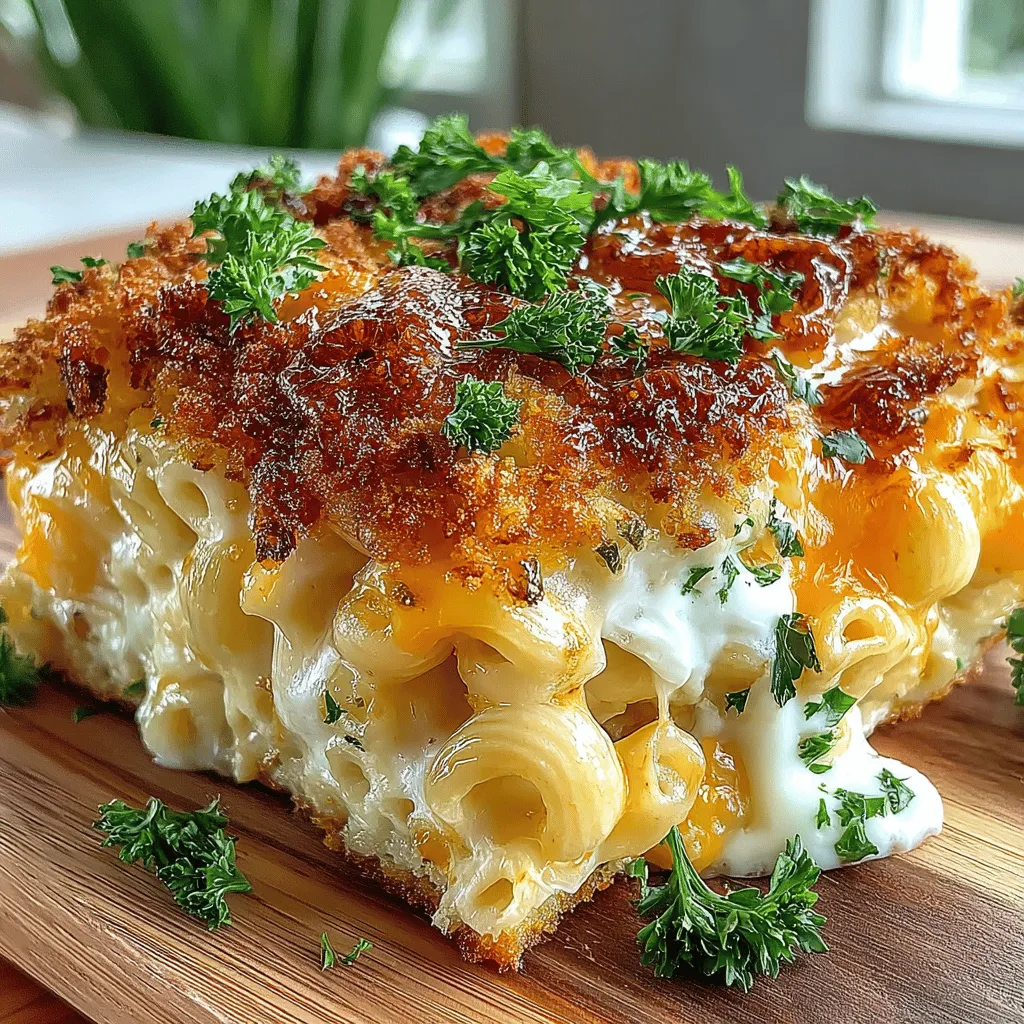Classic Mac & Cheese with Crispy Topping
Introduction
Macaroni and cheese, commonly known as mac & cheese, is a quintessential comfort food that has warmed hearts and filled bellies for generations. This creamy, cheesy dish is not just a staple in American households, but it has also made its mark on dining tables around the world. The rich combination of tender pasta enveloped in a luscious cheese sauce is a delightful experience that transcends mere sustenance, offering a sense of nostalgia and comfort that few foods can match.
One of the defining features of an exceptional mac & cheese is undeniably the crispy topping. This layered crunch adds a delightful contrast to the creamy interior, elevating the dish from simple to spectacular. The topping not only enhances the texture but also contributes an additional layer of flavor, creating a symphony of sensations with each bite.
In this article, we aim to provide you with a detailed, step-by-step guide to creating the perfect classic mac & cheese with a crispy topping. Whether you are a novice cook or an experienced chef looking to perfect your technique, you will find valuable tips and insights that will lead you to a delicious result.
The Allure of Classic Mac & Cheese
The history of mac & cheese can be traced back to the 18th century, when it was first documented in a cookbook in England. The dish gained popularity in the United States during the 19th century, particularly after being featured in a recipe by Thomas Jefferson, who had encountered it in Italy. Over the years, mac & cheese has evolved into a beloved classic, appearing on menus from casual diners to upscale restaurants.
Its versatility is evident in the various adaptations found around the globe. From the rich and creamy versions found in the southern United States to the gourmet interpretations topped with truffle oil or lobster, mac & cheese has successfully adapted to different tastes and culinary trends. Despite its many variations, the core elements remain the same: pasta and cheese, working harmoniously to create a comforting dish that appeals to all ages.
What sets our recipe apart is the meticulous attention to detail, ensuring that each component—from the pasta to the cheese and the crispy topping—is carefully selected and prepared. The balance of flavors and textures in our classic mac & cheese will leave you craving more, making it a standout option among countless recipes available.
Ingredients Breakdown
To embark on your culinary journey toward the perfect mac & cheese, it is essential to understand the key ingredients and their roles in the dish. Each component contributes to the overall flavor and texture, making it crucial to use high-quality ingredients whenever possible.
1. Elbow Macaroni: The traditional choice for mac & cheese, elbow macaroni is favored for its shape, which allows the cheese sauce to cling to the pasta effectively. Its small size and hollow center create the perfect vessel for holding onto that creamy goodness. Alternatively, you can experiment with other pasta shapes, such as shells or cavatappi, which also work well in this dish.
2. Dairy Selection: The heart of any great mac & cheese is the cheese sauce, which relies heavily on dairy products. Whole milk is preferred for its creaminess and ability to create a rich sauce when combined with cheese. As for cheese, a blend of sharp cheddar and creamy mozzarella is ideal for achieving a balance of flavor and meltability. You can also experiment with other varieties like Gruyère or fontina for a unique twist.
3. Seasonings: To elevate your mac & cheese from ordinary to extraordinary, seasonings play a pivotal role. A touch of mustard powder adds a subtle tanginess, while garlic powder infuses a warm, savory depth. For those who enjoy a hint of heat, a pinch of cayenne pepper can be added for an extra kick.
4. Crispy Topping: The crowning glory of your mac & cheese is undoubtedly the crispy topping. A combination of panko breadcrumbs and grated Parmesan cheese creates a crunchy layer that contrasts beautifully with the creamy pasta. Panko breadcrumbs are preferred for their lighter, airier texture, which results in a delightful crunch.
5. Ingredient Substitutions: Recognizing that dietary preferences vary, it is useful to know that there are several substitutions available. For those with gluten sensitivities, gluten-free pasta can be used without sacrificing flavor. Dairy-free alternatives such as almond milk or cashew cheese can also be utilized for a vegan-friendly version.
Step-by-Step Instructions to Perfecting Your Mac & Cheese
Cooking the Pasta:
The first step in creating your classic mac & cheese is to cook the pasta. The key to achieving the perfect texture lies in cooking the pasta al dente. This means that the pasta should be firm to the bite rather than fully soft. Cooking it just right will ensure that it maintains its shape and provides a delightful chew, even after being mixed and baked with the cheese sauce.
To prepare the pasta, start by bringing a large pot of salted water to a rolling boil. The salt not only enhances the flavor of the pasta but also helps to season it from within. Once the water is boiling, add the elbow macaroni and stir occasionally to prevent sticking. Cook the pasta according to the package instructions, typically around 7-8 minutes, but keep in mind that you want it to be slightly undercooked since it will continue to cook when baked in the oven.
Once the pasta reaches the al dente stage, drain it thoroughly in a colander. It is crucial not to rinse the pasta, as this will wash away the starches that help the cheese sauce adhere to it. After draining, set the pasta aside while you prepare the cheese sauce, ensuring that it is ready for its flavorful transformation.
By understanding the importance of each ingredient and the initial cooking steps, you are well on your way to creating a classic mac & cheese that will impress family and friends alike. Stay tuned for the next part of the article, where we will delve into mastering the cheese sauce and achieving that coveted crispy topping.
Crafting the Cheese Sauce
Creating the perfect cheese sauce is the heart of any classic mac and cheese recipe. The foundation of this creamy delight begins with a roux, which is a mixture of flour and fat (typically butter) cooked together. This mixture serves as a thickening agent for your sauce.
Making a Roux
To start, melt 4 tablespoons of unsalted butter in a saucepan over medium heat. Once the butter is fully melted and bubbling slightly, add 4 tablespoons of all-purpose flour. Stir continuously with a whisk for about 2 minutes until the mixture is smooth and has a light golden color. This step is crucial as it removes the raw flour taste and contributes to the smooth consistency of the sauce.
Tips for Avoiding Lumps
As you progress to the next step of adding milk, it’s essential to do this gradually. Slowly pour in 4 cups of whole milk while whisking vigorously. This method helps to prevent lumps from forming in your sauce. If lumps do develop, don’t panic! A quick blitz with an immersion blender can help smooth everything out.
Achieving Creamy Texture and Rich Flavor
The choice of cheese is vital for both flavor and texture. A blend of sharp cheddar and Gruyère cheese works wonders, providing a balance of tanginess and creaminess. Grate the cheese rather than using pre-shredded varieties, as pre-shredded cheese contains anti-caking agents that can affect melting. Combine about 2 cups of grated sharp cheddar and 1 cup of grated Gruyère into your sauce, stirring until melted and smooth. For an extra depth of flavor, consider adding a pinch of garlic powder or a dash of cayenne pepper.
Combining Pasta and Cheese Sauce
Once your cheese sauce is ready, it’s time to bring everything together. Start by cooking 1 pound of elbow macaroni in a large pot of salted boiling water. Cook the pasta until al dente, as it will continue to cook in the oven. Drain the pasta and return it to the pot.
Ensuring Even Coating
Pour the cheese sauce over the drained macaroni while it’s still warm. To ensure that every piece of pasta is well-coated, gently fold the pasta and cheese sauce together with a spatula. Avoid stirring too vigorously to prevent breaking the pasta. The warmth from the macaroni will help the sauce cling better.
Balancing Pasta and Sauce
It’s important to find the right balance between pasta and cheese sauce. You want a rich, creamy texture without it being soupy. If you feel the mixture is too thick, a splash of reserved pasta water can help loosen it up, making it easier to achieve that velvety consistency.
Preparing the Crispy Topping
No mac and cheese is complete without a crispy topping that adds texture and flavor. For this, we’ll be using panko breadcrumbs, which are lighter and crispier than traditional breadcrumbs.
The Science Behind Panko
Panko breadcrumbs are made from white bread without the crusts, resulting in a flakier texture. This quality allows for maximum crunch when baked. To prepare your topping, combine 1 cup of panko breadcrumbs with 2 tablespoons of olive oil and ½ cup of grated Parmesan cheese in a bowl. Toss the mixture until the breadcrumbs are evenly coated. The olive oil not only enhances the flavor but also helps achieve that beautiful golden-brown color when baked.
Assembling and Baking
Before assembling, preheat your oven to 350°F (175°C). Greasing your baking dish is essential for easy serving. Use butter or cooking spray to coat the bottom and sides of a 9×13-inch baking dish.
Importance of Greasing
Proper greasing helps prevent the mac and cheese from sticking to the dish, ensuring that each serving comes out intact. Transfer the macaroni and cheese mixture into the prepared baking dish. Evenly sprinkle the panko topping over the mac and cheese, ensuring that it covers every inch for a uniform crunch.
Optimal Baking Time and Temperature
Bake the dish in the preheated oven for 25-30 minutes, or until the top is golden brown and crispy, and the cheese is bubbling. If you desire a deeper golden color, feel free to broil the dish for the last 2-3 minutes, watching closely to avoid burning.
Serving Suggestions and Pairings
Classic mac and cheese is a versatile dish that pairs beautifully with a variety of sides and beverages, enhancing the overall meal experience.
Side Dishes
Consider serving your mac and cheese with a fresh side salad to balance out the richness. A simple arugula salad dressed with lemon vinaigrette adds a peppery bite that complements the creamy dish. Alternatively, roasted vegetables like Brussels sprouts or broccoli can provide a delightful crunch and a burst of flavor.
Beverage Pairings
When it comes to beverages, a crisp white wine such as Sauvignon Blanc or a light-bodied red like Pinot Noir can elevate your dining experience. If you prefer beer, a craft pilsner or a hoppy IPA can contrast nicely with the creamy cheese sauce, providing a refreshing palate cleanser between bites.
Conclusion
Homemade mac and cheese is more than just a meal; it’s a comforting dish that evokes nostalgia and joy. Crafting this classic from scratch allows you to control the flavors, textures, and ingredients, making it a truly personal creation. From the creamy cheese sauce to the crispy topping, each component plays a vital role in delivering that ultimate comfort food experience.
Don’t hesitate to experiment with variations—try incorporating different cheeses, adding in sautéed mushrooms or crispy bacon, or even mixing in vegetables like spinach or tomatoes for an extra nutrient boost. The possibilities are endless, and the satisfaction of sharing this dish with loved ones makes it all the more rewarding. Enjoy the journey of perfecting your mac and cheese recipe, and relish every delicious bite!


